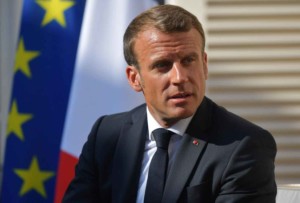

From the French role during the Rwandan genocide to its colonial-era crimes in Algeria and looting of indigenous art, President Emmanuel Macron has gone further than predecessors in recognising some of the darker chapters of his country’s past in Africa.
But historians say more needs to be done to restore France’s image on a continent where its long history of meddling in former colonies has created a poisonous legacy, particularly for young Africans.
The latest development in France’s reckoning with its past came on Friday, when a historical commission set up by Macron concluded that France bore “overwhelming responsibilities” in the 1994 Rwandan genocide.
The report accused France, which had close ties to the Hutu regime behind the massacre of ethnic Tutsis, of being “blind” to preparations for the mass killings, though it found no evidence of French complicity in the bloodshed.
The French presidency said it hoped the report would engineer an “irreversible” reconciliation between France and Rwanda, which welcomed the historians’ findings as an “important step”.
But for Macron, the endgame is bigger, a French presidential adviser said.
“Beyond Rwanda, we think this report will have an impact on our whole relationship with Africa,” said the adviser, who asked not to be named.
– Smashing French taboos –
As France’s youngest post-war president, born after the end of the colonial period in the 1960s, Macron has attempted to smash several taboos around his country’s past since winning power in 2017.
While campaigning for president, the 43-year-old declared that the colonisation of Algeria was a “crime against humanity” — an admission that deeply upset conservatives in France, where colonial rule was long portrayed as benign.
ALSO READ: Traffic enforcement: Sanwo-Olu unveils body worn camera gadgets for law enforcement officers
In 2018, Macron followed up by acknowledging that France had instigated a system that facilitated torture during the 1954-1962 Algerian war of independence, and in March this year he acknowledged for the first time that French soldiers had murdered a top Algerian independence figure.
On his watch, France has also agreed to return prized artefacts that were looted by colonial forces from Benin and Senegal, and to cut some of its links with West Africa’s CFA franc, a currency seen as a colonial relic that has been renamed the Eco.
– ‘Hidden agendas’ –
The overtures to Africans come at a time of rising anti-French sentiment in several West African countries, fuelled, according to Le Monde newspaper, “by the colonial image, the idea of hidden agendas, exploitation and alleged neo-colonialism”.
Long after countries including Mali, Ivory Coast and Algeria had gained their independence, Paris continued to pull the strings, propping up authoritarian strongmen who looked after French interests.
France’s meddling, known pejoratively as its “Francafrique policy”, left a deep well of resentment that has endured despite attempts by successive leaders since Nicolas Sarkozy to create more balanced relationships.
During a visit to Burkina Faso in 2017, Macron stressed that his youth spelt real change.
“I’m from a generation that doesn’t come to tell Africans what to do,” he said.
READ ALSO: New York state legalizes recreational marijuana
But his call for young Africans to move on from a past that they too did not personally experience got short shrift.
– Jostling for influence –
“The fact of being from a new generation and a young president does not change the course of relations between France and African countries,” Gilles Yabi, president of Senegal’s WATHI think-tank, told AFP.
“It’s as if you’re asking young Africans to consider that a page has been turned just because you say so,” said Yabi, who views Macron’s outreach as a continued attempt to defend France’s interests on a continent where China, Russia and Turkey are gaining influence.
Algerians particularly have expressed disappointment at Macron’s refusal to issue an official apology for abuses committed during the colonisation.
For Antoine Glaser, a journalist specialised in Franco-African relations, Macron is “trying to erase the colonial and post-colonial period, as if by magic.”
But young Africans, he argued, “are more concerned about being able to move to France to study or work, and about the glass ceiling they slam into once here.”
A recent survey by the French Council of Investors in Africa showed France lagging behind the United States, Germany and Canada in terms of its image among African opinion leaders.
France ranked seventh, just ahead of Turkey.
[AFP]
The post From Algeria to Rwanda: Macron tackles dark chapters of France’s past appeared first on Vanguard News.
by Rasheed Sobowale via Vanguard News https://ift.tt/39x49Gc Best Known Member of the Cabinet Wikipedia
Comments
Post a Comment